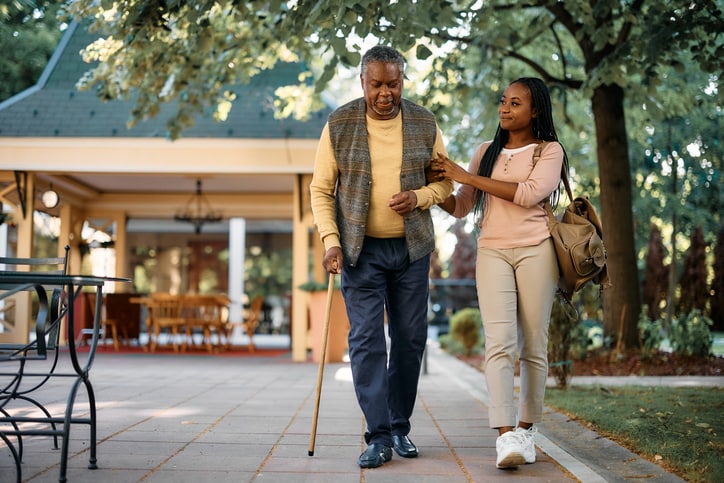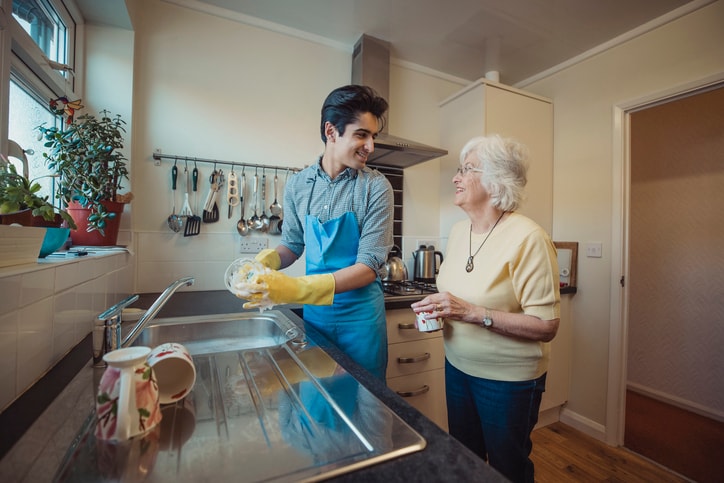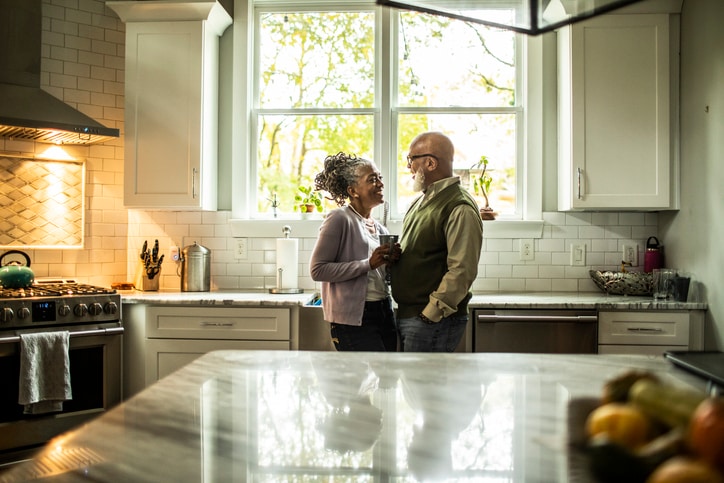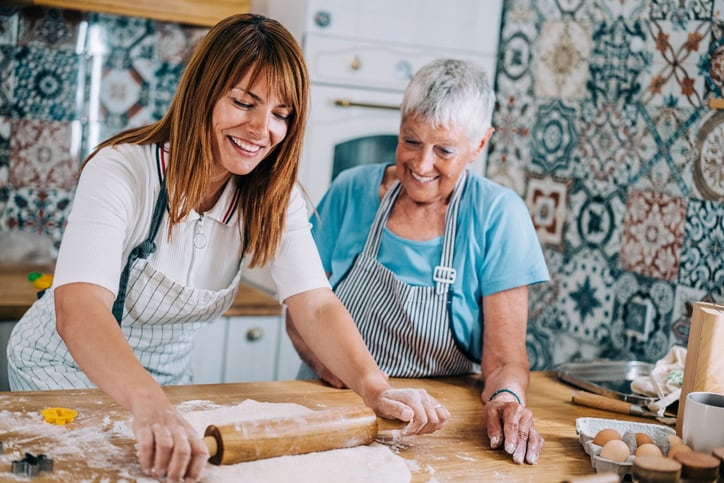Some of us fall into family caregiving unexpectedly, but even those who long planned on serving in this role are caught off guard by surprises along the way.
Caregiving can be unpredictable, especially as medical, mobility and even emotional needs of a senior change over time (and sometimes overnight). As conditions deteriorate, caregivers often find their lives changing to accommodate their loved one. Not all of these changes are welcome, and the sacrifices of caregiving can take a toll on careers, relationships, finances and other areas of life.
At the same time, family caregivers of seniors often report happy surprises, such as bonding with their loved one, feeling purposeful and getting to give back to a relative who once cared for them.
To explore how family caregiving is deeply life-changing — both the good and the bad — we spoke to 10 real family caregivers about their journeys. In their honest words, here’s how their lives look different since they became a family caregiver of an aging loved one, along with the ways they cope with changes and challenges along the way.
1. I need a support team
How my life has changed:
My time has to be shared with my mom first; feeding her, bathing her, cleaning her space, and ensuring that the supplies used for her care are well-stocked. I have been blessed to have met a woman that comes in twice a day, that helps me with caring for her. Having a part-time caregiver’s assistant takes a huge load off my daily routines. This help really comes in handy when planning time away and vacations with my family. Another great help is working in the same areas where I live; if for any reason I need to go home and deal with her, most of the time I’m able to do so.
How I cope:
Being transparent with my supervisor about my home life has been a lifesaver. Finally, I cannot exclude the help I get from my young son and wife. They see the huge life change, mood change, exhaustion, and sacrifices I make for my mom; in some cases, they’re sacrificed in terms of my time. The biggest level of love and support truly comes from them.
Name and location: Victor Kelly in Silver Spring, Maryland
Job: Service technician for utility company
Family caregiver for: 90-year-old mother with dementia
2. I put my own life on hold
How my life has changed:
I moved 1,200 miles away from my son and his family in order to care for my parents, which was very emotionally challenging. I also left my entire support system of friends and my job. Over the eight years, I had to leave my executive position to a position which was more accommodating to my caregiving responsibilities. Eventually, needing to leave my 30-year career and take positions that were under my level of expertise and pay level. Because of job changes I went through my 401K and all of my savings. This was to cover my own expenses, not my parents’. I had to become the CEO of my parents’ life, so our roles changed dramatically.
How I coped:
Over the eight year process, I did use part-time help, sometimes hiring friends of friends and at other times using agencies. I re-engaged my therapist, who encouraged me to use a journal to manage my emotions, some of the difficult relationships with siblings and document all of the appointments and the entire journey. Afterward, my caregiving journey impacted my life in so many ways that I started my company to help caregivers along their journey. I teach self-care strategies, which include therapeutic journal writing. My business was a joint idea between my mother and I to assure that others would benefit from her journey.
Name and location: Lori Ramos Lemasters in Denver, Colorado (though relocated to California while caregiving)
Job: Author of “You’re a Caregiver Not a Saint, Yeah Write!” and founder of Care Partners Resource
Family caregiver for: Mother who survived a massive stroke and father who was on dialysis and had early onset dementia (both have passed)
“I feel I have a clearer sense of my personal priorities, namely that health comes first and is our most valuable resource we all have. It was hard for many years to see my grandmother’s quality of life decline.”
— AMANDA REES, CEO AND COFOUNDER OF BOLD
3. I have more clarity on my priorities
How my life changed:
As a result of being a caregiver, I feel I have a clearer sense of my personal priorities, namely that health comes first and is our most valuable resource we all have. It was hard for many years to see my grandmother’s quality of life decline.
I found that being a caregiver impacted everything from my social schedule with friends to my dating life and my health. I would skip important personal events, whether it was dinner plans with a friend or taking a much-needed yoga class after work, in order to get home in time to make dinner or relieve the professional caregiver from their shift. Over the weekends, I spent so much time cleaning up after accidents, making meals and doing laundry, that I realized I was constantly either working on my career or working as a caregiver, which left little time left for me to recharge, so I got burnt out.
How I cope:
From that point, I learned to seek support by either asking family or outsourcing certain tasks to professionals, like hiring a cleaner, ordering meal deliveries, and making time for therapy and exercise for myself.
Name and location: Amanda Rees in Los Angeles, CA
Job: CEO and cofounder of Bold, a digital health company focused on fitness for older adults
Family caregiver for: Recently deceased grandmother with dementia, blindness from glaucoma and stage 4 cancer.
4. Being spontaneous is no longer an option
How my life has changed:
So much; it’s almost like having a child. From having to secure care, to preparing meals, bathing, feeding, activities, factoring in time to get both of us prepared for outings, doctor appointments, and the list goes on and on. My life is no longer my own, and spontaneity — what’s that??
How I cope:
While spontaneity is not in my vocabulary, I do plan for regular respites and make time for self-care. In fact, I live by the philosophy of “selfullness”…the sweet spot between “selfishness” and “selfullness.” Caregivers are often selfless, giving of themselves to their loved one, which leads to the lack of self-care. Additionally, caregivers view self-care as selfish and feel a sense of guilt if, and when, they do take time for themselves. Lack of self-care of the caregiver results in lack of care of their loved one, which is not sustainable for either.
Name and location: Dawnita Brown in Baltimore, Maryland
Job: Full-time sole caregiver and founder of Hey Caregiver! which offers support groups, a podcast, and education for the Black family caregiver community
Family caregiver for: 72-year old mother, a brainstem stroke survivor
5. I’m always prepared for emergencies
How my life has changed:
I’m in the sandwich generation, meaning I’m raising my family and caring for my elders at the same time. I’ve learned to have materials and paperwork organized, anticipate issues that might become emergencies and that using a strong advocate’s voice is essential in reducing the stress, improving the care I give and allowing for some sanity.
How I cope:
I have to constantly remind myself to take breaths, to laugh and to direct some compassion and understanding back towards myself. I’ve come to realize that eldercare is a shared responsibility. Everyone has a role to play in eldercare — each family member can do something — especially show gratitude. Have a family conversation. Ask everyone to help. Ask what they want to do and what they can do. Even family who lives at a distance can assist in some way. It takes a team. Be the recruitment director and build the team. I also regularly share my stories about eldercare with friends going through the same journey. We laugh, we hug and we give each other the space to share our frustration as well as our victories.
Name and location: Suzanne Asaff Blankenship in Golden, Colorado
Job: Speaker and author of “How To Take Care of Old People Without Losing Your Marbles”
Family caregiver for: Elderly mother for over 10 years, and co-caregiver for father-in-law for 3+ years and mother-in-law for over 12 years.
” At times over the years, I found myself quite overwhelmed, but am extremely blessed to have a very kind and incredibly helpful partner who has treated my parents as if they were her own.”
— MICHELLE BOYANER, FILMMAKER
6. I’ve cut back on business travel
How my life has changed:
Assuming the responsibility of becoming my dad’s caregiver has forced me to make major
scheduling sacrifices like adjusting my travel schedule and business activities. Before becoming my dad’s caregiver, I would travel locally and internationally on a regular basis. The caregiver journey has forced me to make plenty of sacrifices but has been rewarding, making new memories with my dad.
How I cope:
I believe self-care is essential for caregivers. I spend time fishing when I can get away and always enjoy reading a great book. Recently, I was able to hire a part-time companion who spends 12 hours a week with my dad. This has allowed me to schedule time to write and focus on other priorities.
Name and location: David Miller in Washington, D.C.
Job: Ph.D. candidate in social work and author of children’s books
Family caregiver for: 83-year-old father with dementia and major depression
7. I’ve become a pro at flexibility
How my life has changed:
I am fortunate to be self-employed so my schedule can be flexible to accommodate the ongoing issues and time commitments that helping care for an aging loved one can present. At times over the years, I found myself quite overwhelmed, but am extremely blessed to have a very kind and incredibly helpful partner who has treated my parents as if they were her own. Due to my mother’s increased cognitive issues, we eventually moved her into a board and care home where she received wonderful care.
How I cope:
As a documentary filmmaker, one thing that really helped me as I navigated the very real experience of caregiving for my aging parents was to document our family’s journey in the hopes that our story (and the stories of others) could help people traveling this same path.
Name and location: Michelle Boyaner in Los Angeles, California
Job: Filmmaker; writer, director, producer of documentary “It’s Not A Burden: The Humor and Heartache of Raising Elderly Parents”
Family caregiver for: Grandmother with dementia and mother with cognitive impairment and then dementia (both have passed). Now helps father with respiratory issues and cognitive decline.
8. My role reversed with my parent
How my life has changed:
I visit with my dad for a few hours, two to three times per week. It’s not always easy to carve that time out of my busy clinical social work private practice. My dad was always a very neat man. He kept all of his belongings in order. When I visit him in the nursing home, I usually organize his closet and pick up around his room, because there is little attention by the staff to keep his space tidy and organized.
How I cope:
Initially I was frustrated by this, but now I take it as an opportunity to be with my dad and helping him to maintain his dignity. My training as a social worker has been very helpful. I regularly engage in self-care and make getting a good night’s sleep a priority.
Name and location: Zander Keig, Orlando, Florida
Job: Co-founder of the LGBTQ Caregiver Center, licensed clinical social worker and health educator, US Coast Guard veteran
Family caregiver for: 81-year-old father with dementia who resides in the Florida Nursing Home for Veterans (he served in the US Marine Corps)
“Initially I was frustrated by this, but now I take it as an opportunity to be with my dad and helping him to maintain his dignity.”
— ZANDER KEIG, LICENSED CLINICAL SOCIAL WORKER
9. I cannot enjoy my life
How my life changed:
I now have PTSD from the things I saw and experienced as part of my mother’s harrowing, horrifying episode 50-day hospital stay, and it has altered my relationship with my partner, my son and my work colleagues. I have to set aside at least one to three hours every single day to deal with things related to my mother, whether it is calling and arguing about bills, dealing with people at her facility, taking calls from her, [contacting] friends of hers, sending the POA to everyone under the sun so I can manage her finances, hacking into various online accounts so I can take care of address changes and bill pay.
I cannot ever relax. I cannot enjoy my life. Every day is a crisis or a problem. [After assisted living], I will have to move her to a memory care facility. Memory care is more than $8,000 a month. Her current facility is $5,000 a month. When her money runs out (projected 12-14 months), I have to enroll her in Medicaid and find yet another facility for her to live at and move her a fourth time inside a year.
How I cope:
I buy a lot of takeout so I don’t have to cook, and I have done a lot of online shopping. I bought like seven pairs of boots this fall!
Name and location: Nina McCollum in Cleveland, Ohio
Job: Content writer
Family caregiver for: Mother with cognitive impairments following an episode of medication-induced psychosis and hospitalization
10. I’ve learned to find help and resources myself
How my life has changed:
I had to leave my 20-year career. I had to learn to find my own local resources because hospitals and healthcare networks and doctors are not a reliable source and rarely do they know of resources other than in-home care agencies and assisted living locations. Finding and hiring reliable care can be tough and managing a care team can be a learning curve. Especially since the people I care for resisted it at first.
How I cope:
Honestly, having great caregivers is a lifesaver — not only for the people I care for but for me as a family caregiver.
Name and location: Christina Keys in Vancouver, Washington
Job: Director of Community Growth at Caregiving.com
Family caregiver for: Mother since 2013, who had a stroke and left her paralyzed, and ex-boyfriend, who had a stroke in 2019 and now lives in an adult family home





